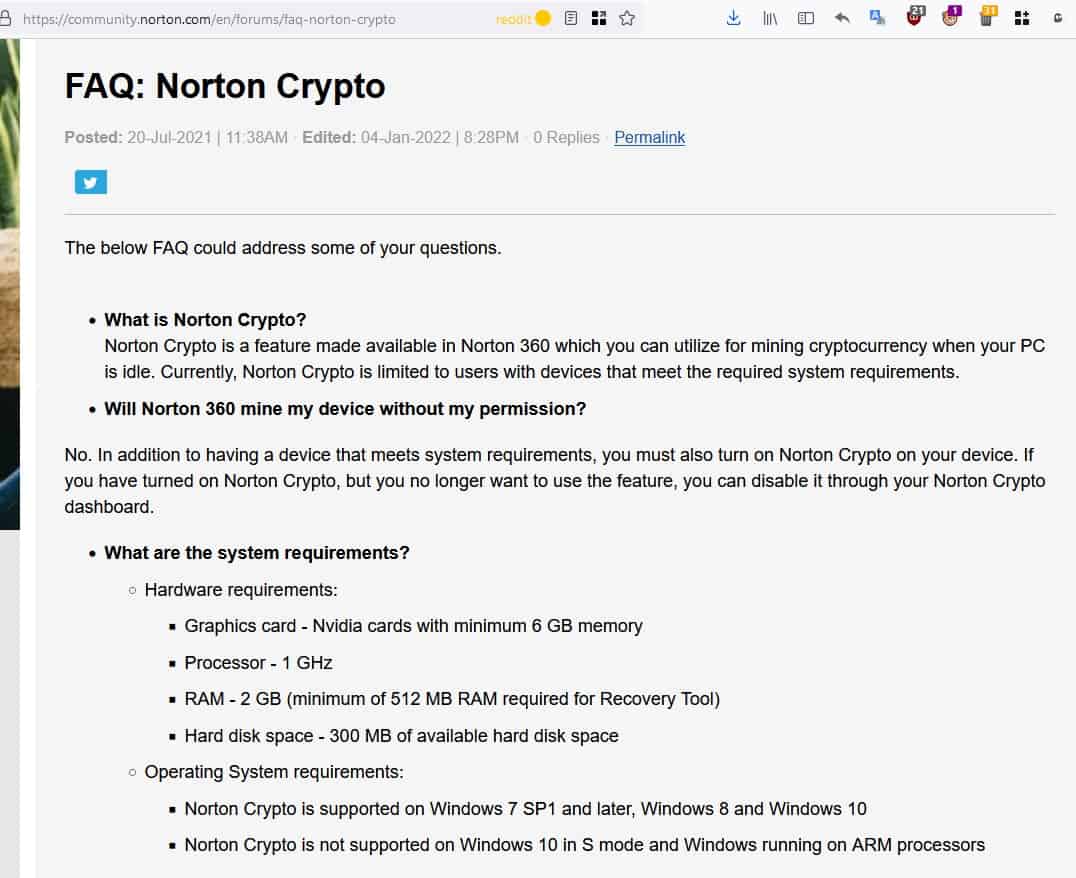Over the past month or so, we have seen a rise of bloatware added to Microsoft Edge. If you thought that was bad, wait till you hear this. Norton 360 is installing a crypto miner on users computers, it's called Norton Crypto.

Are you wondering how an antivirus vendor can resort to such shady measures. Isn't the product supposed to prevent such potentially unwanted programs from being installed, and running on the computer? Well, it's all legal, and well documented too. It was first announced last year, here's an FAQ page on Norton's website that explains how Norton Crypto works.
The cyber-security firm terms Norton Crypto a "feature", which will utilize your PC to mine cryptocurrency when Norton 360 detects that the system is idle. The settings will be managed by Norton.
Norton Crypto is available on all plans. The currency that the software mines is Ethereum, and Norton creates a digital wallet for each user before it starts mining. The documentation states that the digital key for the wallet is only available to the user, is encrypted and stored in the cloud. Users can transfer their digital wallets contents to Coinbase, to make withdrawals.
The company is looking to add more currencies in the future. And it gets worse, this crypto mining feature is not free either. Norton will charge users 15% of the crypto that was allocated to the miner (user). The transfer of the cryptocurrency (to Coinbase) between the blockchain networks could also result in additional transaction fees. Great, you don't even get the full amount that you are owed.
Does it affect your computer? If it meets the system requirements, there is a possibility. Here are the details, for reference.
Norton Crypto system requirements
- Graphics card - Nvidia cards with minimum 6 GB memory
- Processor - 1 GHz
- RAM - 2 GB (minimum of 512 MB RAM required for Recovery Tool)
- Hard disk space - 300 MB of available hard disk space
- Operating System: Windows 7 SP1 and later, Windows 8 and Windows 10
The RAM, Hard Drive and Processor requirements are quite low, but the graphics card requirement is kind of high. So, theoretically, this shouldn't impact the majority of users, but if you have a 6GB graphics card, it is likely going to be mining cryptocurrency.
Norton says that Norton Crypto is currently only available in the US, and that this is a throttled release (A/B testing).
Is Norton Crypto enabled by default?
The official website states that Norton Crypto is not enabled by default, but some users claim otherwise and that the new version is installing the crypto miner without the user's consent. According to this thread on Twitter, the antivirus installs a miner called NCrypt.exe. Some users have suggested that it can be deleted from the software's directory after disabling the Tamper Protection from the antivirus' settings. Here's another interesting discussion about it on HackerNews.
Other antivirus programs seem to be detecting the file as malware, which is fair, in my opinion.
How can I tell if my computer is mining cryptocurrency?
Open the Windows Task Manager, if the system's CPU or memory usage is at 100% while there are no programs running, it is likely being used to mine cryptocurrency. Certain websites use your browser for mining cryptocurrency as well, you may notice it when your computer begins to lag. If you ever run into such sites, stop, install uBlock Origin and try again. Do yourself a favor, and switch to a better antivirus. For the price of free, Windows Defender does an incredible job, while not slowing down your computer. This is, of course, my personal opinion, so do what you will.
When the NortonLifeLock and Avast Merger was announced, I thought this sounds bad, but I certainly did not expect this. To quote Harvey Dent, from The Dark Knight, "You either die a hero or you live long enough to see yourself become the villain". Norton, you are the virus now!

Are you using Norton 360? Has your computer's performance been impacted by Norton Crypto? Will you continue using it after reading about this fiasco?
Thank you for being a Ghacks reader. The post Users claim that Norton 360 antivirus installs a crypto miner on PCs appeared first on gHacks Technology News.


0 Commentaires